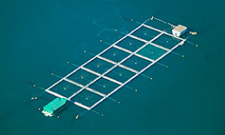Farmed salmon is BC's largest Agri Product and a significant contributor to our local economies.
Farmed salmon is raised naturally. That means no hormones or genetic modification to enhance growth.
Medications are never used preventatively or near harvest time.
We take steps to reduce stress on our fish.
In the Pacific Northwest, Atlantic salmon have not taken over rivers forcing out native salmon.
Salmon are incredibly efficient eaters.
Salmon farms employ thousands of workers in BC's coastal region.
Farmed salmon is the only way we can get fresh salmon year round.
Farmed salmon is a healthy food choice that's available fresh all year round.
Salmon farming is the most regulated agricultural industry in British Columbia.
Salmon farm locations are selected for their low environmental impact.
Atlantic salmon and sockeye salmon differ in colour because they're different species.
Farmed salmon are vaccinated to prevent disease and rarely need additional medications.
We don't dye farmed salmon. The colour comes from an important ingredient in their food.
Farmed salmon are rich in heart-healthy omega 3 fatty acids.
Farmers work to protect wild salmon from sea lice.
Salmon farming provides real economic and social benefits to First Nations people.
Salmon feed is designed specifically to conserve wild fish stocks.
Farmers work with scientists to maintain fish health.
Farmed salmon are mistreated and are raised in a stressful environment.
Farmed salmon is genetically modified and contains growth hormones.
Salmon farms can be located anywhere, even in environmentally sensitive areas.
Salmon farm information is highly guarded and not available to the public.
Farmed salmon is bad for you.
Sea lice come from farmed salmon and devastate wild salmon stocks.
Farmed salmon consume more food in order to grow than the amount of food they produce for human consumption.
Farmed salmon contain medicines that are harmful for human consumption.
Salmon farmers can do whatever they want and routinely ignore loose government regulations.
Escaped farmed salmon take over local river systems forcing out native wild salmon.
There are no nutritional benefits realized from eating farmed salmon.
The process of salmon farming severely depletes wild fish stocks.





1 Comment